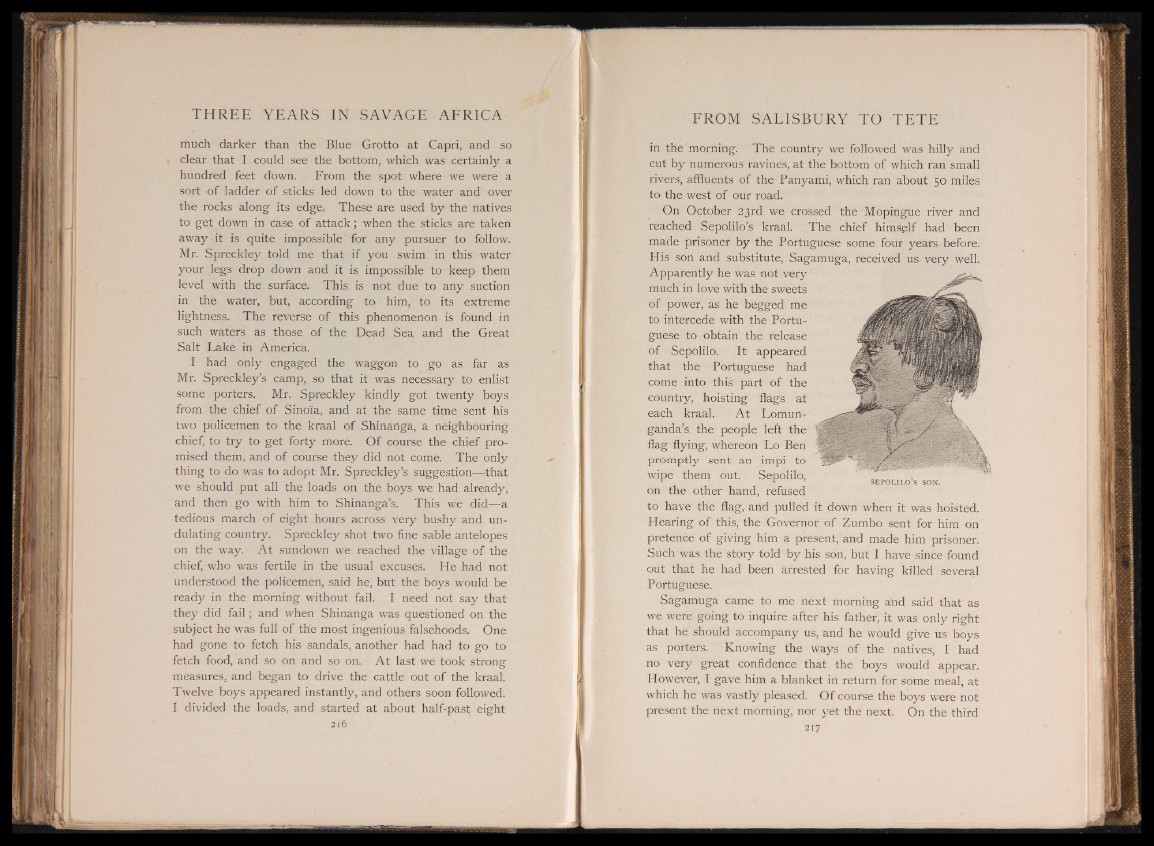
much darker than the Blue Grotto at Capri, and so
clear that I could see the bottom, which was certainly a
hundred feet down. From the spot where we were a
sort of ladder of sticks led down to the water and over
the rocks along its edge. These are used by the natives
to get down in case of attack; when the sticks are taken
away it is quite impossible'for any pursuer to follow.
Mr. Spreckley told me that if you swim in this water
your legs drop down and it is impossible to keep them
level with the surface. This is not due to any suction
in the water, but, according to him, to its extreme
lightness. The reverse of this phenomenon is found in
such waters as those of the Dead Sea and the Great
Salt Lake in America.
I had only engaged the waggon to go as far as
Mr. Spreckley’s camp, so that it was necessary to enlist
some porters. Mr. Spreckley kindly got twenty boys
from the chief of Sinoia, and at the same time sent his
two policemen to the kraal of Shinanga, a neighbouring
chief, to try to get forty more. Of course the chief promised
them, and of course they did not come. The only
thing to do was to adopt Mr. Spreckley’s suggestion^that
we should put all the loads on the boys we had already,
and then. go with him to Shinanga’s. This we did—a
tedious march of eight hours across very bushy and undulating
country. Spreckley shot two fine sable antelopes
on the way. At sundown we reached the village of the
chief, who was fertile in the usual excuses. He had not
understood the policemen, said he, but the boys would be
ready in the morning without fail. I need not say that
they did fail; and when Shinanga was questioned on the
subject he was full of the most ingenious falsehoods. One
had gone to fetch his sandals, another had had to go to
fetch food, and so on and so on. At last we took strong
measures, and began to drive the cattle out of the kraal.
Twelve boys appeared instantly, and others soon followed.
I divided the loads, and started at about half-past eight
2 16
in the morning. The country we followed was hilly and
cut by numerous ravines, at the bottom of which ran small
rivers, affluents of the Panyami, which ran about 50 miles
to the west of our road.
On October 23rd we crossed the Mopingue river and
reached Sepolilo’s kraal. The chief himself had been
made prisoner by the Portuguese some four years before.
His son and substitute, Sagamuga, received us very well.
Apparently he was not very
much in love with the sweets
of power, as he begged me
to intercede with the Portuguese
to obtain the release
of Sepolilo. It appeared
that the Portuguese had
come into this part of the
country, hoisting flags at
each kraal. At Lomun-
ganda’s the people left the
flag flying, whereon Lo Ben iSlcPSfiijS
promptly sent an impi to
wirp e them out. Sepr o lilo,’ M iSEPOLILO S SON.
on the other hand, refused
to have the flag, and pulled it down when it was hoisted.
Hearing of this, the Governor of Zumbo sent for him on
pretence of giving him a present,'and made him prisoner.
Such was the story told by his son, but I have since found
out that he had been arrested for having killed several
Portuguese.
Sagamuga came to me next morning a'nd said that as
we were going to inquire after his father, it was only right
that he should accompany us, and he would give us boys
as porters. Knowing the ways of the natives, I had
no very great confidence that the boys would appear.
However, I gave him a blanket in return for some meal, at
which he was vastly pleased. Of course the boys were not
present the next morning, nor yet the next. On the third
2 17